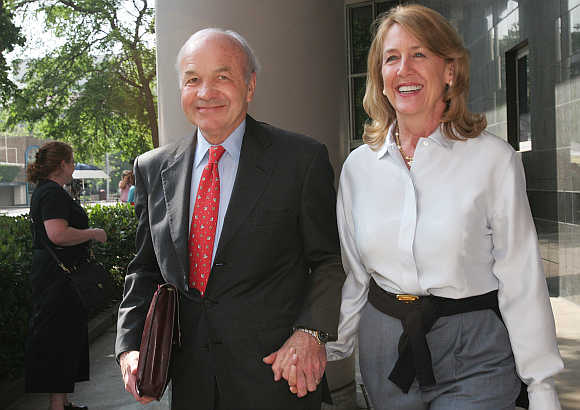 | « Back to article | Print this article |
Former Enron CEO's sentence cut by 10 years
Former Enron CEO Jeffrey Skilling serving a 24-year prison term for his role in the once-mighty energy giant's collapse has succeeded in getting his prison sentence reduced by 10 years as part of an agreement with prosecutors.
US District Judge Sim Lake shaved off the prison sentence of Skilling, 59, who has been in prison since 2006, by 10 years, closing the book on one of the most spectacular white-collar cases of the last two decades.
The long-running battle between federal prosecutors and Skilling formally came to an end when US District Judge Sim Lake signed off on a negotiated sentence agreement.
With the sentence reduction and time off for good behaviour, he could go free in 2017.
Click NEXT to read more...
Former Enron CEO's sentence cut by 10 years
"This is not an easy decision to make," Lake said about the number of months to choose. "The two most significant factors are the need for the sentence to deter others from similar action and to reflect the seriousness of the offense 168 months adequately reflects both concerns. The court is not persuaded a longer sentence is necessary."
As part of the resentencing deal brokered between prosecutors and the defence last month, Skilling agreed to stop challenging his conviction and forfeit roughly $42 million that will be distributed among the victims of the Enron fraud.
"The sentence handed down today ends years of litigation, imposes significant punishment upon the defendant and precludes him from ever challenging his conviction or sentence," Acting Assistant Attorney General Mythili Raman said in a statement.
Click NEXT to read more...
Former Enron CEO's sentence cut by 10 years
It's unclear exactly when Skilling will be released under his new 14-year sentence. The Justice Department referred questions on the issue to the Bureau of Prisons, which declined to comment.
Victims, including former Enron employees and stockholders, were invited to speak at the resentencing hearing. More than 4,000 employees lost their jobs and some also lost their life savings, which were tied up in the company investment retirement plans. Investors lost billions of dollars.
Click NEXT to read more...
Former Enron CEO's sentence cut by 10 years
The name "Enron" has become synonymous with white collar crime, just as the name "Madoff" has become synonymous with Ponzi schemes.
Skilling has maintained his innocence throughout the duration of the scandal, just like his CEO predecessor Kenneth Lay, who founded Enron. Lay was also convicted, in 2006, of corporate fraud. But he died later that year at age 64 while on vacation, just months before his scheduled sentencing.



